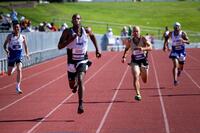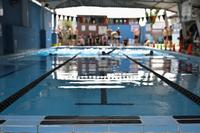You know you are getting older when some of the first military students you taught back in the 1990s are now getting ready for or past the age of military retirement. Here is an email from one of my special-ops candidates who went on to become a Navy SEAL and now is feeling some aches and pains from many years of working hard and playing hard.
"Stew, I am glad to see you are still going strong with coaching and writing about it. It is hard to believe that 21 years ago, I started on this journey and am getting ready to retire. Now at 44 years old, I am feeling the knees, lower back and shoulders more than any other decade. I know you are about 5-6 years older than me, so what did you find you had to do as you hit 40-50 years old? I am not looking at stopping. Just know I need to be smarter with training in the future -- starting now." J.J.
J.J., it's good to hear from you, too. First, congrats on a successful military career and thank you for your commitment of 20+ years.
I hear you. I do have a few new rules to go by for general health and maintenance, especially after turning 40 years old. You still can do advanced-level workouts with these rules. Just make sure you actively pursue recovery methods like eating well, sleeping, hydrating, breathing deeply and taking rest days.
Follow these rules, which are part of the programming used in the 52-week, four-part training series: Tactical Fitness 40+. From Rebuilding the Foundation to getting Ready to Compete, this series uses the following four rules religiously:
Regardless of your goals, the mobility day added to the mid- to late week will enhance the later workouts of the week or weekend and help you walk out of the gym without pain.
You can no longer outwork your diet. Focus on smaller portions. Avoid junk food and sugar. Do not avoid fruits and vegetables, because these are good carbs that are high in nutrients you need for energy and recovery. Drink more water. This one takes discipline. The old habits of eating like we were highly active 20-year-olds is a tough one to break, even if you are still highly active after 40.
Run every other day. Unless you still are competing in races or under 200 pounds, consider running every other day instead of daily or 5-6 times a week. Do non-impact cardio options (bike, row, elliptical, swim) instead on the days between runs. You can build up distance or speed as you prefer on your running days to help you maintain your abilities in many tactical professions and keep your weight down, especially if you're still taking military fitness tests.
Add a mobility day each week. You either can replace a typically challenging workout with this mobility day or add it to a day off each week. It is simple but effective. See routine options below:
Repeat five times
- Bike, elliptical, row or swim five minutes
- Foam roll, stretch, car buffer massage five minutes
Learn how to foam-roll, stretch daily or car-buffer massage. That is right. A car buffer is what I use to get a deep vibration that is soothing to the muscles. This must be an orbital/vibrating car buffer, not a rotary (spinning) car buffer. Apply to your joints, muscles and lower back for near immediate soothing effects. But stretching and a foam roller should be the mandatory parts of this rule -- daily.
My final piece of advice is to get lighter. Try not to gain too much weight, even during heavy lifting cycles. It is easy to gain a pound or two a year, and in 5-10 years, you "suddenly" will be 10-20 pounds overweight.
Being lighter is just easier to move, puts less pressure on your joints and typically means you have a healthy body fat percentage. I have found that the heavier I am, the worse my blood screening numbers are, and it hurts more to run.
Stew Smith is a former Navy SEAL and fitness author certified as a Strength and Conditioning Specialist (CSCS) with the National Strength and Conditioning Association. Visit his Fitness eBook store if you’re looking to start a workout program to create a healthy lifestyle. Send your fitness questions to stew@stewsmith.com.
Want to Learn More About Military Life?
Whether you're thinking of joining the military, looking for fitness and basic training tips, or keeping up with military life and benefits, Military.com has you covered. Subscribe to Military.com to have military news, updates and resources delivered directly to your inbox.



















